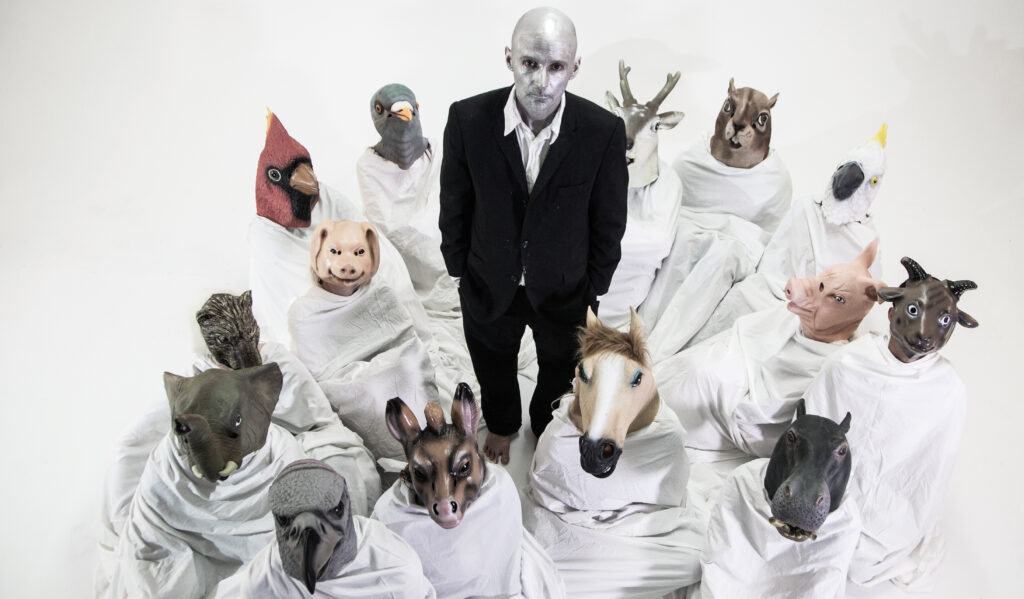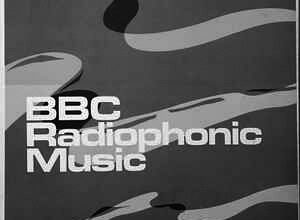Lining up as Moby & The Void Pacific Choir, the latest adventure from rave’s first superstar stirs both sonically and morally. Who else can combine angry indignation with hands-in-the-air joy so successfully?
The widely travelled DH Lawrence didn’t rate California. Seeing Los Angeles for the first time, the visionary English author and poet wrote in a letter to a friend that “it has turned its back on the world, and looks into the void Pacific.”
It’s a quote that resonated so strongly with Moby, an LA resident of six years, that his latest project ‘These Systems Are Failing’, is produced under the name Moby & The Void Pacific Choir.
“In an offhand way, Lawrence was maligning people in Los Angeles,” he explains. “But I liked the subtext and accidental wordplay. Much of the past 2,000 years of philosophy has concerned itself with looking into the void: what is this giant unknowable cipher that exists temporarily outside of ourselves? The void has always been perceived as a dark, malignant and malicious Nietzschean philosophy. But maybe it’s actually neutral or even benign. A pleasant pacific, a peaceful void – a benign emptiness. That’s LA, and it’s the human condition too.”
Readers of Moby’s highly acclaimed recent memoir ‘Porcelain’ will appreciate this tone of a stranger in a strange land that peppers his conversation and informs his latest work.
Documenting a decade that was insane by anyone’s standards (broadly speaking the 1990s)his tale saw him move from factory-squatting sci-fi nerd to someone on the cusp of global success. A sequel has stalled somewhat as Moby claims it is addled with the usual clichés associated with unexpected stardom.
Delivered from the bemused standpoint of a Christian dweeb who finds himself at the centre of a worldwide bacchanal, ‘Porcelain’ was as much a portrait of, and paean to, Moby’s beloved New York. It is the city that made him. The place where he absorbed hardcore punk at matinee shows at CBGBs, spun house tracks and rubbed shoulders with Clark Kent, drag queens and club kids at Mars, sourced an endless supply of tofu and where he bought stolen samplers off crackheads on the street for $10.
So to find him not only now living in LA, a city known for its superficiality and dark psychic undercurrents, but also drawing creative inspiration from it is something of a surprise.
“When I first moved here I longed for the simple cohesion of a regular western city,” he says.”Human urban life in LA is the exception, not the rule. It exists among a disinterested emptiness because it is a city in name only. It’s much easier to understand it as a sprawling, baffling, mountainous county. There’s a state park here that’s empty, save for bears and rattlesnakes, which is bigger than New York City.
“After a while the paradoxical aspects start to become really compelling. There is a bizarre combination of elements – there’s the desert, the empty oceans, and Latinos and Eastern Europeans and all manner of cultures. Then you mix in cheap disposable entertainment and some great architecture and some terrible architecture and so much odd art… you can’t help but be changed by it.”
Moby is no stranger to change. We join him over a quarter of a century after he released his ‘Twin Peaks’-sampling breakthrough single ‘Go’. The song was tucked away on a B-side, but soon became so ever-present that for several years he was mistakenly referred to as Moby Go. Back then he was living in an abandoned factory in the wilds of Connecticut and living off oatmeal. Even up until the release of his career-saving 1999 album ‘Play’, he was often headlining to 50 people a night.
In the interim however he has sold 20 million albums and worked with the likes of David Bowie, Michael Jackson, New Order, Britney Spears, Guns N’ Roses and Brian Eno, whose wry, boffin-like polymathic persona he perhaps most publicly resembles.
His life has changed irrevocably then, yet you sense that he has not. It’s 9am and he has already been up for three hours, hiking and doing Tai-Chi “because I am a middle-aged sober guy, and a complete LA cliché”. Look, you think: it’s Moby, being utterly Moby-esque.
If LA is a city of paradoxes, then he remains that pop star made from a similar misshapen mould. The straight-edge vegan whose religious faith can be detected down the years in the rapturous rave anthems, although he favours the theological tag “Taoist-Christian-agnostic quantum mechanic”.

You know his story: that of the underground guy whose crossover album was famously licensed to death. One whose every track appeared on adverts and soundtracks and was so ubiquitous it transcended its format to become symbolic of something broader. ‘Play’ was the ultimate music-as-lifestyle-accessory, a signifier of urbane self-awareness. It provided background muzak for the coffee shop and internet café boom. A soothing antidote for the anxious age. A dot com soundtrack.
This quietly exuberant man’s continued success – and it may surprise you to learn that the most legally downloaded release of 2013 was Moby’s album ‘Innocents’ – remains faintly absurd.
“Nobody could deny that Moby is very cool,” a friend recently remarked. I disagreed: Moby would. He would definitely be the first to deny any major cultural cachet in 2016
One spin of ‘These Systems Are Failing’ suggests the punk kid is still very much present, as is a desire to create. It is, he says, a collection born out of a fervent sense of anger and indignation with the way that the world is being mismanaged today. The first Moby album to feature him singing on all tracks, it marks neither renaissance nor comeback, but rather a reaffirmation of his pioneer status. His peers may include Ian MacKaye and Steve Albini, but they never DJed at swingers parties or moved seamlessly between socialising with Danny Tenaglia one day, David Lynch the next. Moby has casually woven himself into the fabric of mainstream America and beyond.
Sonically his new work sits at the confluence where the dark dystopias of post-punk and proto-goth, pulsing new wave pop, synth-prog and wantonly OTT rave anthems meet. The result is an alternative world where Magazine, The Chameleons, Bauhaus or Sisters Of Mercy might have discovered MDMA and sequencers, and went nuts in 24-hour warehouse parties.
In conversation Moby points at geopolitics, environmentalism, conversation, energy production, the treatment of animals, agriculture, wealth distribution and capitalism as systems that are failing, finding hope only in (perhaps unsurprisingly) technological advancements and democratic political systems. This album isn’t about solving issues, he asserts. It’s about raising them.
“I’m happy to be oblique about the agitprop album title, and for it to be a meme,” he shrugs. “All I hope for is that someone looks around and asks themselves what systems is this guy on about, and how can we remedy it?”
It may seem pessimistic in tone or appear jaded here in print, but Moby is pathologically incapable of writing songs that don’t have some sort of hands-in-the-air moment. His is the work of a realist with a wide romanticist’s streak. He can’t help but include a killer hook to pull the listener back from the brink of the psychic abyss. ‘These Systems Are Failing’ also finds Moby at a stage in his career doing exactly what he wants, for the sheer love of it.
“A lot of music I grew up listening to, punk stuff especially, may have had a bleak message, but it was so powerfully delivered that the energy within created a sense of euphoria. If you think of a piece of music such as ‘Big Takeover’ by Bad Brains: it’s a song about Nazis. It’s an anti-Nazi song that is utterly euphoric. Or think of, say, ‘London’s Burning’ or even ‘London Calling’ by The Clash. They’re both bleak dystopian songs, but they’re also happy and celebratory.
“It’s a paradox to have grim content presented in a euphoric way, or complex music delivered in a blunt manner, but that’s OK. Personally I don’t want to make music that isn’t in any way emotionally satisfying or even joyful to listen to. I approached this album like a four-year old would make breakfast. I put together all my favourite disparate ingredients: I like punk rock, post-punk, euphoric rave and I like yelling a lot.”
‘These Systems Are Failing’ was first recorded as a choral work and completed in 2014, but with his memoir on the way the album was delayed. In the meantime Moby decided to scrap every song and rewrite the album entirely.
“About a year ago I was driving in my car listening to Wire, Buzzcocks and XTC and they stopped me in my tracks,” he explains. “I thought, ‘Is anyone channelling this type of exuberant energy today?’. Metal bands maybe, but very few independent solo musicians. Right now it feel likes there’s a self-imposed ceiling of 130bpm, whether in dance music, hip hop or indie rock. It’s too polite. So I rewrote the entire album then played the new songs to people at my American label, who respectfully thought they were very aggressive. So I had this petulant moment where I went back and made this quasi-aggressive album even more so. There’s no choir on the record any more but the name stuck.”
If ‘Play’ captured the millennial zeitgeist by being a marketing man’s dream, then it nevertheless led Moby into a void of another sort: that of the hyper-successful artist who has moved so far from their past that they become in danger of losing themselves entirely. The man born Richard Melville Hall, who grew up in suburban poverty playing Dungeons & Dragons, has enjoyed his share of booze indulgences and group sex with strippers and all manner of jet-setting, pan-international japes while riding the crest of a music industry wave all the way to the scorched shore that it is today, one littered with non-recyclable pop detritus and piratical digital booty.
“People just don’t buy music anymore, so it would be the height of absurdity for a 51-year-old musician to struggle and compromise to make a record in 2016 in the hope that someone might buy it. It’s the equivalent of a self-published poet expecting to be on the cover of Vanity Fair with their next collection.
“For years people have always asked why, if I’m so politically active, my music doesn’t reflect this? I never had a good answer. So I thought why not try to make music that hopefully, in some presumptuous way, tries to advance the dialogue and if possible somehow make the world a better place. You know, we have extreme material abundance now, but the biggest tragedy is that nobody is happy. If anything, that is what ‘These Systems Are Failing’ is about. That, and me jumping around, yelling again.”
Get the print magazine bundled with limited edition, exclusive vinyl releases



Thoughts return to Moby’s adopted LA. In the past two years he has sold a 12-bedroom faux-Norman castle called Wolf’s Lair in the Hollywood Hills for a cool $12.4 million (but not before converting the Tiki bar to a music studio, naturally), to downsize to a Los Feliz mansion that cost a mere $3.4 million, but then bought the mansion next door too. People may not be purchasing music, but Moby is unequivocally thriving.
With this much money floating about, and a long-term commitment to political activism (most notably continuing to campaign for animal rights) and friends in high places, one wonders whether pop music is still a worthwhile format.
“It’s certainly still a compelling medium for me, yes,” he says. “It may not be the best medium through which to explore incredibly detailed policy minutiae, but it is still the most fun. I mean, sometimes you want to just put Led Zeppelin on and escape. In the olden days you could be making Fleetwood Mac’s ‘Rumours’ and be miserable yet still go on to sell 30 million records. But that’s changed today, for everyone, right across the arts. For me the emotional satisfaction of music now has to be found solely in the act of creation. And that’s still there, always.”
‘These Systems Are Failing’ is out on Little Idiot






